Chris from West Virginia asks an important question:
I found myself Googling, “What is eternal life in Greek,” and stumbled upon a Quora forum where someone had asked the same question.
The first answer…I found [was] not only concerning, but confusing. Does Eternal Life NOT mean eternal life?
Chris gave a lengthy quote that can be summarized as follows:
- The expression everlasting life refers to 1) a relationship with God that starts with the new birth and 2) a quality (not quantity) of life that is permanent.
- The permanent relationship requires turning from our sins and believing in Jesus.
- The relationship is permanent as long as we meet our covenant obligations of ongoing repentance and faith.
- If someone fails to persevere, then he has broken the covenant and his permanent life goes away.
It is certainly confusing to say that everlasting life refers to a permanent relationship with God, yet it does not refer to the quantity of that life. How can something be permanent and yet not permanent? Of course, that is Chris’s question.
Our Professors in our Greek studies at Dallas Theological Seminary taught us that a little knowledge of Koine Greek is dangerous.
Many pastors and Bible teachers know just enough Koine Greek to confuse people. Chris is right to be confused and concerned.
A key principle of hermeneutics–interpretation–is that words or phrases are understood by looking at their context. We do not impose a one-size-fits-all definition on words or phrases. We do not look up dictionary definitions of everlasting (aiōnios) and life (zōē) and then come up with some meaning for the phrase. That is what the person Chris read did.
Instead, we look up the actual Greek phrase and see how it is used.
The Greek translated everlasting life is often zōēn aiōnion (e.g., John 3:15, 16, 36; 4:14; 5:24, 39; 6:40, 47). In John’s Gospel, it is often simply called life without the adjective that means everlasting (e.g., John 3:36; 5:24, 40; 20:31).
Here are some clear contextual statements that show that zōēn aiōnion indeed does refer to quantity of life:
- “Whoever drinks of the water that I shall give him will never thirst” (John 4:14). The Greek has an emphatic double negative (ou mē). The woman at the well understood Him to speak of something that could never be lost when she replied, “Sir, give me this water, that I may not thirst, nor come here to draw” (John 4:15). She was wrongly thinking in physical terms. But she rightly understood that what Jesus was offering was permanent once received.
- “He who hears My word and believes in Him who sent Me has everlasting life, and shall not come into judgment, but has passed from death into life” (John 5:24). Here the Lord uses three different verb tenses (present, future, past) to underscore the irrevocability of the life He gives.
- “He who comes to Me shall never hunger, and he who believes in Me shall never thirst” (John 6:35). These, too, are emphatic double negatives.
- “He who lives and believes in Me shall never die [spiritually]” (John 11:26). Again, this is a double negative.
So, if you find a living human being who believes in Jesus for everlasting life, you’ve found someone eternally secure. He does not become eternally secure if he perseveres in faith and good works until death. He is eternally secure when he partakes of the Bread of Life/the Water of Life.
No major English translation renders zōēn aiōnion as life for the ages. It is always rendered as either eternal life or everlasting life.
New Testament commentators suggest that there are two aspects to everlasting life, quality and quantity.
Commenting on everlasting life in John 3:16, Morris wrote:
The word rendered “eternal” (always in this Gospel used of life) basically means “pertaining to an age.” The Jews divided time into the present age and the age to come, but the adjective was used of life in the coming age, not that of the present age. “Eternal life” thus means “the life proper to the age to come.” It is an eschatological concept (cf. 6:40, 54). But as the age to come is thought of as never coming to an end the adjective came to mean “everlasting,” “eternal.” The notion of time is there. Eternal life will never cease. But there is something else there, too, and something more significant. The important thing about eternal life is not its quantity but its quality (John, p. 201, emphasis added).
Likewise, Borchert writes,
zoē aiōnios probably is best translated “eternal life,” stressing the qualitative feature of life as over against mere physical endless life or everlasting life. Such a rendering, however, is not meant to exclude the idea of life without end because it is also said that those who eat the bread of life “will live forever” (John 6:58) (John 1-11, p. 182).
Jesus said that He came that we might have life and that we might have it more abundantly (John 10:10). There is a possible fullness of this life that is unending. Mature believers have a more abundant walk with Christ than new believers do. But everlasting life is everlasting for all believers, mature and immature.
One of my seminary Professors, Dr. Charles Ryrie, was right when he said, “If everlasting life could be lost, it has the wrong name.”


